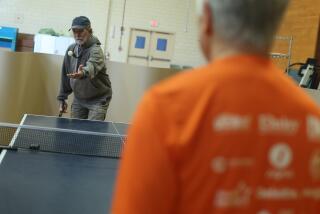Robert E. Litman dies at 88; co-founder of suicide prevention center
- Share via
Dr. Robert E. Litman, a psychiatrist who co-founded the nation’s first comprehensive suicide prevention center more than 50 years ago in Los Angeles and carried out groundbreaking work there, has died. He was 88.
FOR THE RECORD:
Robert E. Litman obituary: A photo that appeared with a news obituary in Sunday’s California section misidentified Dr. Robert E. Litman and Norman Farberow. Litman is on the right, Farberow on the left. —
Litman died Feb. 14 of acute leukemia at a daughter’s Manhattan Beach home, said his wife, Connie.
“He was something of a genius,” said Sam Heilig, a social worker who helped establish the center. “He was a prominent psychoanalyst . . . and a very creative thinker. He did strong, imaginative, adventurous work.”
In 1958, when research into suicide was almost nonexistent and largely discouraged, the Los Angeles Suicide Prevention Center opened in a dilapidated, abandoned tuberculosis ward on the grounds of Los Angeles County Hospital.
As chief psychiatrist, Litman was seen as an inspired team leader. He guided the development of suicide prevention services that became the prototype for such centers in the U.S. and abroad.
In Los Angeles, the center set up the nation’s first 24-hour suicide crisis hotline and in 1964 became the first to train nonprofessional volunteers to answer phones.
The researchers developed the idea of “the suicidal crisis” -- that most suicidal people are acutely so for a relatively short time -- and devised a way to evaluate who was at highest risk of suicide.
Three decades after the center was founded, the suicide rate in Los Angeles had been halved, Litman told the New York Times last year.
Working with the coroner’s office, Litman led an early-1960s team that developed the “psychological autopsy,” which used interviews with survivors to help determine whether a death was caused by suicide or accident. Its most famous case was Marilyn Monroe, whose 1962 death was ruled “probable suicide.”
Litman’s “case of the week” seminars at the center were renowned for their spirited discourse and the big names from across the country who came to participate.
The idea for a suicide prevention center came from two Veterans Administration psychologists, Edwin S. Shneidman and Norman L. Farberow, who convinced Litman, over drinks in Beverly Hills, to help establish it.
Then director of the psychiatric unit at what is now Cedars-Sinai Medical Center, Litman had written a paper on how to deal with suicide on a hospital ward.
His interest in the subject was sparked by the death of his high school best friend, Thomas Heggen, who wrote the book and play “Mister Roberts” and whose 1949 death was ruled a probable suicide.
Although worried that the response to the proposed suicide center would be overwhelming, Litman signed on.
In the 2006 book “November of the Soul,” by George Howe Colt, Litman recalled: “People were calling us and literally saying, ‘I’m just about to make a suicide attempt -- do I have to take these pills or jump off a building before I can talk to you? Or could I shortcut it and come in directly?’ ”
For years, Litman was a “brilliant, effective, practical, productive, stimulating psychiatrist-in-chief,” Shneidman, who died last year, wrote in “Autopsy of a Suicidal Mind” (2004).
When the center almost went broke in the 1990s, the Westside’s Didi Hirsch Community Mental Health Center absorbed it and kept it going.
More than 175 staff members and volunteers fielded more than 36,000 hotline calls last year, according to Kita Curry, president of the Didi Hirsch center.
Almost until his death, Litman remained active at the center, training new counselors with co-founder Farberow, 92.
In a statement, Curry said Litman “had a zest for life that he deeply believed resided in us all.”
Robert Elkon Litman was born April 7, 1921, in Minneapolis and grew up mainly in Hope, N.D., the eldest of four sons of town doctor Morris Litman and his wife, Goldie, a social worker. Two brothers became doctors, the other a dentist.
At 16, Litman graduated from high school and by 21 he had earned his bachelor’s and medical degrees from the University of Minnesota.
After serving as an Army doctor in Korea during World War II, he returned to Minneapolis. He worked in a veterans hospital and met his future wife, Connie, whom he married in 1952.
In the 1950s, he moved to Los Angeles partly because he “could play tennis here all year,” his wife said. They had four children; one, Katherine, is a doctor in Torrance.
Long after a patient’s treatment ended, Litman would keep in touch.
“He had breakfast with one young man once a week,” his wife said. “He just wanted to check in to see if he was OK. In a lot of ways, he was like his father the country doctor. That was his idea of what you did.”
Besides his wife, Connie, of Manhattan Beach, Litman is survived by his children, Katherine, Jane, Joseph and Margo; brothers Arthur, Richard and Tom; and two grandchildren.







